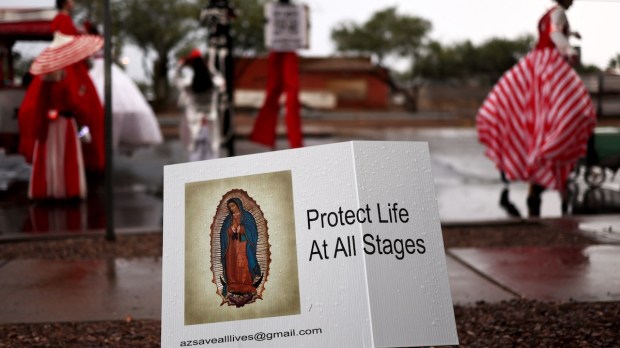A Florida amendment to protect a “right” to an abortion up to the point of viability failed to gain passage on Election Day. It was perhaps the highest profile pro-life win November 5, but two other states voted to protect unborn human life as well, and one state rejected assisted suicide.
Seven states passed pro-abortion amendments, including Arizona, Colorado, Maryland, Missouri, Montana, Nevada, and New York.
Florida’s Amendment 4 would have protected a right to abortion in the state, but the proposal fell short of the 60% needed for passage. It could muster only 57%. The vote means the Sunshine State’s six-week ban will remain in place.
Florida’s Republican Governor Ron DeSantis and his administration helped fight the amendment. The governor, who had sought the GOP nomination for president, steered state Republican Party funds to the effort.
“We are profoundly relieved at the defeat of Florida’s pro-abortion Amendment 4. This is a positive outcome for Florida and all efforts to promote the flourishing of our state,” said the Florida Conference of Catholic Bishops in a statement Wednesday.
Their sentiments were tempered with concern, however, that a majority of voters supported Amendment 4 abortion in Florida. The bishops warned that abortion “will continue at a very high rate under our current laws.”
“Much work remains to open hearts and minds to the dignity and goodness of life in the womb and at every stage,” the bishops’ conference said. “We will continue to proclaim in our churches and in the public square the value of every human life and to highlight that there is a better way forward for women, families and society than abortion.”
Nebraska voters rejected a pro-abortion ballot measure and voted for a pro-life one. Initiative 439, which would have allowed late-term abortion and would have effectively abolished nearly 50 years of abortion legislative restrictions in the state, garnered only 48.7% of the vote.
More than 55% of Nebraska voters instead opted for the pro-life alternative, Initiative 434, which gives constitutional protection to the unborn in the second and third trimesters and permits further legislative restrictions of abortion throughout pregnancy.
South Dakota’s ban on abortions with an exception to save the life of the mother will remain in place, as a majority of voters cast a ballot against an initiative to legalize abortion during the first and second trimesters of pregnancy, CNN reported.
“Voters in Nebraska also weighed in on the issue as they faced dueling measures on the ballot,” CNN said, “one that would invalidate the state’s 12-week abortion ban, which makes exceptions for sexual assault, incest and medical emergencies, and the other to uphold the restriction.”
Rejection of assisted suicide
By a slim margin, West Virginians voted for a state constitutional amendment to prevent the legalization of assisted suicide.
Amendment 1, which passed 50.44% to 49.56%, prohibits doctors, health care providers or others from participating in assisted suicide, euthanasia, or “mercy killing.”
MetroNews, based in Charleston, West Virginia, reported shortly after midnight on Wednesday that the tally difference stood at about 5,500 votes.
The amendment specifically provided protection for “the administration or prescription of medication for the purpose of alleviating pain or discomfort while the patient’s condition follows its natural course.” It also said it would not prohibit the withholding or withdrawing of life-sustaining treatment, “as requested by the patient or the patient’s decision-maker, in accordance with State law.” It further stipulated that nothing in the amendment would prevent the state from providing capital punishment.
The Catholic Church in West Virginia had supported passage of Amendment 1.
”Our lives are a gift that we did not earn but which we must cherish,” Bishop Mark E. Brennan of Wheeling-Charleston, said in an October 18 statement. “Suicide, even if done for altruistic reasons, is a rejection of our place in the human community, because we choose to leave it before we have to.”
Bishop Brennan added that any of the reasons that lead people to choose assisted suicide “can be met by non-lethal means. Medicine can alleviate much pain. Visits from family members, friends, parishioners and synagogue members, assuring the dying person of their love, can dissipate feelings of isolation and abandonment.”
The bishop also warned that medically assisted suicide “corrupts” the medical profession.
“Those whose goal is to bring healing or at least comfort in a patient’s last days become assistants in taking the lives of their patients,” he wrote. “A fundamental principle of medicine is to do no harm. Medically assisted suicide turns that principle upside down.”




